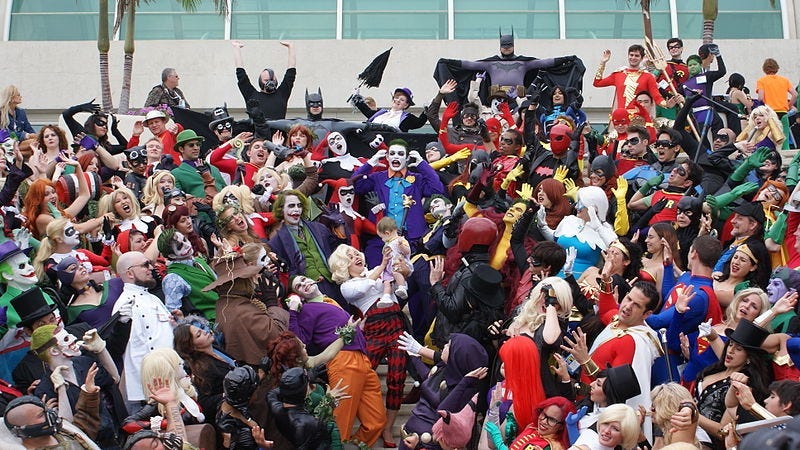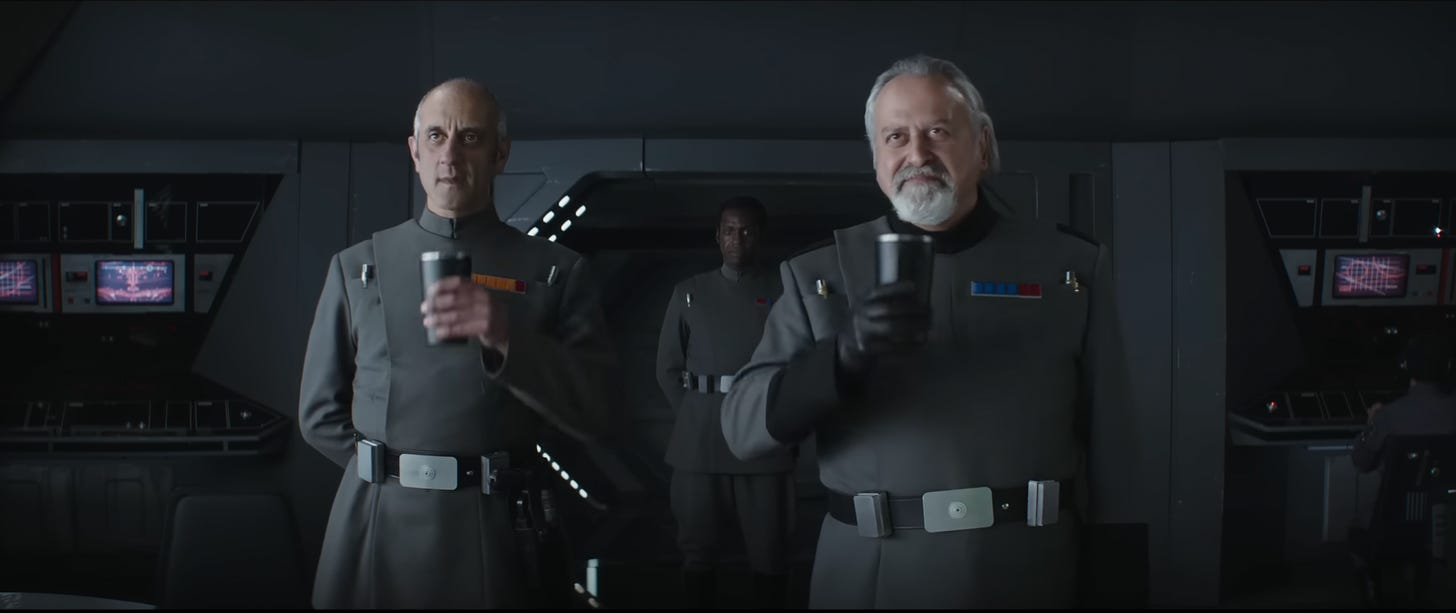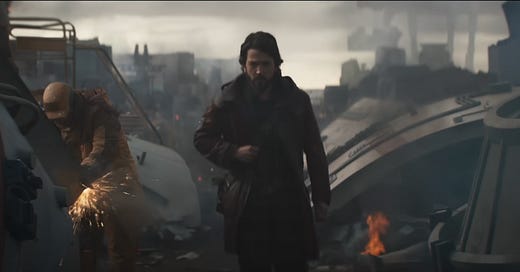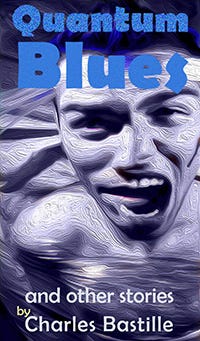
Discover more from Ruminato
Why Andor Is the Best Science Fiction TV Show Ever Made
A story about oppression that speaks to our modern world
Caution: Minor spoilers ahead…
I’ve been a science-fiction fan since I was a young lad listening to singles on my 45 RPM record player. Guess what, kids? That’s a long time.
Unlike many sci-fi fans, I’m not big on fandom. I can’t tell you much about Star Wars canon even though I’ve seen all the movies. Something about a galactic empire, a princess, light sabers, whatever. Who cares?
Same with Star Trek. They boldly go somewhere. That’s about the extent of my knowledge, despite having seen most of what the various Star Trek producers have cranked out. One thing I do know is that when Star Trek canon becomes inconvenient for the producers, they cheat and alter the timeline.
Guess what? I don’t care.
I mean, come on, people — the warp drive became the sperm drive in Star Trek Discovery. Or something like that. I dunno. Maybe it was the spore drive. Does it matter?
If they don’t care about canon, why should I?
I’ve never been to a sci-fi convention of any kind. When I read about them, they creep me out a little.

That said, when I was young, I fell in love with the likes of Harlan Ellison, Philip K. Dick, and Larry Niven. I haven’t kept up much with modern writers, although I occasionally grab a sci-fi novel by one of the newer writers when it looks interesting.
I still gravitate to new science fiction TV shows. When The Expanse appeared, I was ecstatic. A gritty space opera with real character development. Science Fiction on television and cinema, in general, is enjoying a renaissance of sorts, from Stranger Things to The Boys. From Marvel Studios to The Joker to Christopher Nolan (Interstellar) and Neill Blomkamp (District 9). JJ Abrams is usually fun.
I’ve always enjoyed Star Wars, although I consider much of it rather silly. But if I stopped watching science fiction because it gets silly, I’d stop watching science fiction altogether. Silly is part of the deal.
Let’s face it, all the science-fiction shows and movies have ships and explosions that make loud noises in space, so if the standard is science, even basic science, you’re already doomed to frustration.
Ridley Scott’s Alien tagline said, “In space no one can hear you scream,” but you can sure hear the sounds of a TIE fighter.
Andor isn’t a great science fiction show because it’s great science fiction, although it is great science fiction. It’s great because it tells a story about oppression. It’s a story about the British Empire. It’s a story about what modern-day Republicans want to see the United States become. It’s a story about what the United States is already becoming.
And, it’s told with believable characters. And great writing. But be warned, if you’re looking for flying spaceships and battles in space, you’ll be disappointed. Andor is not about that.
That’s one reason that I found this negative review of Andor so ridiculous:
‘Andor’ Episodes 6–12 Review: The Worst Star Wars Property To Date
Under Disney’s so-called “direction,” the once-mighty Star Wars franchise has since descended into creative bankruptcy…boundingintocomics.com
The reviewer was so bent out of shape over a few plot holes or failure to follow the Star Wars canon that he completely missed the point of the show.
If Andor is the best science fiction show I’ve seen on TV, that’s the worst review I’ve ever seen. Anywhere. If you want a master class on how not to write a review, check it out.
The oppression of Andor
The general consensus about the Galactic Empire of Star Wars has always been that it is a metaphor for Nazi Germany. That may or may not have been George Lucas’ original intent, but in Andor, the analogy is clearly The British Empire and the hold it had on its colonies.

I don’t know what Andor’s showrunners would have to say about that, but if they deny it, they’re denying it in order to stay out of trouble with the Brits. After all, most of their actors are from the British Isles. Awkward.
Brilliantly, the show is also a commentary on our own North American empire here in the United States. Intermingling analogies between the two earth empires is part of its subversive charm.
I’m honestly surprised to see a major corporation like Disney on board with a show like this. That seems almost comparable to the Iranian government running a reality TV show called Top Lady Hairdressers or Qatari TV broadcasting Saudi Bikini Beauties.
This is especially true in light of the fact that Disney has largely been pawning mediocrity to the masses. Andor is its token gift to those of us who yearn for a bit more.
Empire analogies are strong in this one
The Galactic Empire is all about extracting everything it can from the planets (colonies) in its realm while sprinkling in an occasional necessary token regard for custom. There are two important scenes in the show where the Galactic Empire pretends to pay respect to local customs to further its gains. If you know anything about the history of the British Empire, that might sound familiar.
In one of those scenes, Empire officers use a local funeral ceremony to set a trap for the titular hero, Andor. That seems more British than Nazi to me. If you’re British, you can hate on me, I guess, but my ancestral background is British, so I get to say these kinds of things guilt-free.
The television show even features a galactic version of The East India Company, the Preox-Morlana (Pre-Mor) Authority, which runs an industrial planet called Morlana One. These sequences involve a great character, Syril Karn, a company manager who has to lick his wounds for several episodes after Andor kills an Authority security agent under his watch.
Kyle Soller, who plays Karn, summons his inner Kyle MacLachlan as he plays a frustrated company stooge stalked and hounded by his overbearing mother after he returns home with his tail between his legs. It’s a masterful character arc that you won’t find in other Star Wars productions.
Genevieve O’Reilly is brilliant as the British — er, Empire legislator Mon Mothma trying desperately to salvage her finances after a rebel heist exposes her dealings with the rebels. Her family arc is so well portrayed that you can roll the dice asking, “Is she a British aristocrat or a Roman senator?” and be correct either way. Or, is she a rich American politician in a near future world where Trumpism finally wins?
Her bargain with the devil is most definitely not out of Star Wars tradition.
Denise Gough plays a wildly ambitious young empire goon so effectively that I found myself rooting for her as she tried to push her way up the leadership chain. But then, remarkably, I still rooted for her demise when the rebellion pushed back. How does an actor even pull that off?
Andor’s portrayal of a military-industrial complex introduces a strong analogy to the military-industrial complex of the United States and its allies. The imperative of empire and dominance is so wired into the bureaucracy of the Galactic Empire’s military machine that it couldn’t escape it if it tried. That should also seem familiar.
Remember the negative review I linked to earlier? The show's two episodes that are devoted to a galactic prison were the reviewer’s most hated because he doesn’t understand the concept of cinematic metaphors.
By portraying a reprehensible prison infrastructure, Gilroy and the rest of Andor’s creative team provide stunning commentary on America’s immoral and disgraceful mass incarceration system.
They start with the rigidly automatic conviction and sentencing procedure that the protagonist Andor experiences, then move to Andy Serkis’s (Gollum in Lord of the Rings) portrayal of Kino Loy, a prisoner who thinks he’ll acquire more privileges if he pushes his fellow inmates to work harder. But most of all, we see a prison system hidden from public view that dehumanizes inmates and isn’t the slightest bit interested in justice.
This comes to a head during the portrayal of a type of lockdown that we assume could never happen in America, but the showrunners effectively ask the question: How would we ever know if it did?
This is brilliant cinema. As good as it gets.
Stellan Skarsgård portrays a rebel leader who painfully bears the scars of the inner conflicts he’s faced through his choices as a rebel intelligence operative.
Luthen’s soliloquy about the pain of being a rebel leader in Episode Ten is one of the best you’ll see in any filmed production, science-fiction or otherwise. You can watch it here. If this isn’t your kind of thing, you won’t like the show:
Andor is also an ode to the many science fiction shows and movies that have preceded it.
Andor pays homage to all kinds of science fiction stories in this series and it never feels like a rip-off. Among the science fiction movies celebrated? George Lucas’s own THX 1138.
The show leans on THX 1138 some as it spends the previously mentioned two episodes inside the prison while speaking to the mendacity of a society that values mass incarceration.
The cityscape visualized while Mon Mothma lifts into the skyline in her luxurious flying, and chauffeured, automobile at one point reminded me of the old movie Metropolis.
Meanwhile, some of the gadgets used by characters have an almost Brazil-like quality to them.
I still haven’t figured out what the large bureaucratic office area where Karn spends some of his days in a cube comes from, but I’m certain I’ve seen something like it before. It has a 1984 feel to it, but there’s something else there. Andor isn’t plagiarizing when it does this kind of thing. It’s celebrating.
There are numerous easter eggs from other science fiction movies and novels. I’ll need to watch the series again to find more. I know I didn’t catch them all.
The show’s set design is beautifully detailed. The production designer deservedly gets serious props in this Verge article:
Andor’s designers approached it like a Star Wars period drama
When production designer Luke Hull was first approached about working on Andor, he felt some trepidation. He was just…www.theverge.com
One of my favorite things about Game of Thrones was the rich detail of the set design. Production designer Luke Hull goes one step better in Andor if that’s possible.
The sentient robot B2EMO, with his Stephen Hawking-type of voice, is amazing, too. He adores his owner and is in turn adorable. When his owner, Maarva Andor (played by Fiona Shaw), passes away, his grief melts the heart of B2EMO’s tough guy friend Brasso. If B2EMO reminds you a little of the robot in the Tom Hanks movie Finch, I’m willing to bet that’s by design, too.
The musical score playing when Andor learns about his mother folds perfectly into the narrative and then into the credits of Episode 11.
I’ve barely touched all the things I love about this show. It’s one of the only TV series I am sure I’ll watch a second time.
Disney gives the credits a full six or more minutes at the end of each show. You might feel cheated that so much of the show’s time is “wasted” with this. I love the celebration of every person who participated in the making of the show, from caterers to grips to the special effects people.
The show’s creators obviously feel that the credits are important. They added an important story nugget after the credits finished running in one of the later episodes.
All of the people behind the show deserve every bit of film space that is devoted to them in the credits, and probably a whole lot more.
Andor is that good.
Notes
A version of this first appeared on Medium in December 2022.
To fully appreciate the scourge of the British Empire upon planet Earth, you should read Legacy of Violence: A History of the British Empire by Caroline Elkins.
I take no comfort picking on the British. I hail from a British background (English, Scot, and Irish, the amalgamation of which means I’m a total mess). With some Norse thrown in so I could have blue eyes.
Did you miss this?
I’ve been jumping between platforms lately (Mailchimp, Substack, Ghost, back to Substack), so it’s possible you missed this freebie.
Quantum Blues is a short story collection featuring a variety of my work over the last 3 years, most of which I have not submitted to magazines. Some of it has appeared elsewhere, mostly on the Medium platform.
The download originates from an Amazon AWS site and is safe, free, and maybe a little rough around the layout/editing edges.
If you love science fiction and/or fantasy, check it out! It will be available soon on Amazon Kindle, too, but it’s always free here for subscribers.





